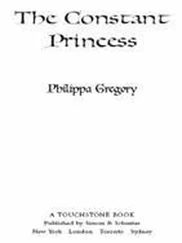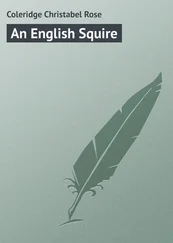Christabel Coleridge - The Constant Prince
Здесь есть возможность читать онлайн «Christabel Coleridge - The Constant Prince» — ознакомительный отрывок электронной книги совершенно бесплатно, а после прочтения отрывка купить полную версию. В некоторых случаях можно слушать аудио, скачать через торрент в формате fb2 и присутствует краткое содержание. Жанр: foreign_prose, на английском языке. Описание произведения, (предисловие) а так же отзывы посетителей доступны на портале библиотеки ЛибКат.
- Название:The Constant Prince
- Автор:
- Жанр:
- Год:неизвестен
- ISBN:нет данных
- Рейтинг книги:4 / 5. Голосов: 1
-
Избранное:Добавить в избранное
- Отзывы:
-
Ваша оценка:
- 80
- 1
- 2
- 3
- 4
- 5
The Constant Prince: краткое содержание, описание и аннотация
Предлагаем к чтению аннотацию, описание, краткое содержание или предисловие (зависит от того, что написал сам автор книги «The Constant Prince»). Если вы не нашли необходимую информацию о книге — напишите в комментариях, мы постараемся отыскать её.
The Constant Prince — читать онлайн ознакомительный отрывок
Ниже представлен текст книги, разбитый по страницам. Система сохранения места последней прочитанной страницы, позволяет с удобством читать онлайн бесплатно книгу «The Constant Prince», без необходимости каждый раз заново искать на чём Вы остановились. Поставьте закладку, и сможете в любой момент перейти на страницу, на которой закончили чтение.
Интервал:
Закладка:
Enrique sat up and looked round, and presently began to laugh heartily himself. “There are your foul fiends,” he said, painting to some carving over the window, where were perched two huge green and scarlet birds with hooked bills, the like of which the boys had never seen before.
“Are they birds?” said Joao, slowly.
“Yes, they are parrots,” said Enrique. “Once, when I went to the Court of Castile, I saw such a one that the King of Granada had sent as a present to my aunt Catalina. Moreover I have read of them in the writings of the ancients. They were sent formerly from Africa to Rome, and these are doubtless favourites of the ladies of this house. For I suspect we are in the ladies’ chamber.”
“But it is wonderful – they laugh,” said Joao.
“Ay, and speak, though not in our tongue. There are wonderful things in the world that we know not of.”
“Well,” said Joao, “since no one can tell what there may be in these Infidel places, I came to take care of Fernando.”
“Indeed,” said Enrique; “I thought you woke me to take care of you. However ’tis small blame to you to have been puzzled.”
Joao, not finding an answer ready, applied himself to trying to catch the parrots, and pursued them on to the balcony, while Enrique looked thoughtfully and curiously round the strange scene which he had entered in the dark two or three hours before. Presently he looked at Fernando, and smiled.
“So,” he said, “Ceuta, praise be to God, is ours, fortress and all, for Zala-ben-Zala fled in the night, and before I came here Duarte and Pedro were there in command. It was your words, Fernando, that set us on this track.”
Fernando blushed deeply. “Enrique,” he said, “I am not a good Christian, and I shall never be like the holy martyrs.”
“Why not!” said Enrique. “I do not wonder that the chattering parrot frightened you.”
“No; but I thought I would do anything in the world to win Ceuta to be a Christian city, and the day our mother was buried, while we knelt in the abbey at Batalha, I made a vow that I would give up my life to convert the Infidel, to win the world back to holy Church.”
“I think,” said Enrique, “that you are too young to make vows save with your confessor’s permission, or what holy Church ordains for you.”
“That is what Father José said, when I told him what I had done. He bade me prepare myself by prayer and obedience for whatever life God might send me. But I did make the vow, Enrique, and I shall keep it. I thought – and this is what I want to tell you – that it would be quite easy, for I thought I cared more about it than about anything in the world.”
“Well,” said Enrique, as Fernando paused, faltering, but with his great ardent eyes fixed on his brother, “surely it is not now in the hour of triumph that you change your mind?”
“No; but dear Enrique, when I thought you dead, I did not care at all about Ceuta: I would have given it back to save you! Was that wrong?”
How little Enrique thought, as he listened with tender indulgence to his little brother’s troubled conscience, with what awful force that question would one day ring in his own ears. Now he put it aside.
“If we were fighting side by side, Fernando, we should not hold each other back; but if it were easy to imitate the holy martyrs, they would the less have deserved their crowns. If we would seek any object earnestly, we most count the cost. But it was ill-managed that you should have had such an alarm. Never heed it. I am safe, and Ceuta is ours, and will be a Christian city soon. And now I must go to make all due arrangements; for we must confess our sins and prepare ourselves for the knighthood that is to come at last.”
Fernando looked after him with admiring envy, as he pictured to himself a future day, when he and Joao should head such another expedition, and be themselves the heroes of it. But all vain-glorious thoughts received a rebuke when he heard Duarte and Pedro petition their father, that since Enrique had certainly distinguished himself the most in the attack, he might receive the honour of knighthood first , before his elder brothers.
The King replied that he owed so much to his son Enrique, that he was willing to grant this request; but Enrique refused, saying that the rights of seniority should be respected; he would rather be knighted in his turn after his brothers.
So the next morning beheld a wonderful and glorious sight. Over the fortress of Ceuta hung the Portuguese colours; instead of the Crescent on the great mosque was to be seen a golden Cross. Within all traces of the Mohammedan ritual had been swept away, an altar which, with all its furniture, had been brought from Lisbon, was erected, and instead of the turbans and the bare feet of the Mussulman worshippers were the clanking spurs and uncovered heads of the Christians; while, most wonderful of all, the sweet peal of Catholic bells for the first time woke the echoes of the Moorish city. (A fact.) For the conquerors had actually discovered, stowed away in the mosque, a peal of imprisoned bells, doubtless carried off from some sea-side church by the pirates of Ceuta.
Then after high Mass had been duly performed, with all the ceremony possible under the circumstances, one by one, Duarte, Pedro, and Enrique stepped forward, and were knighted by their father before the altar of the new Christian church. Nobly had their desire been fulfilled; they had proved their courage, and in a noble cause.
All this time bands of Moorish people were pouring unmolested out of the gates of the city, great numbers choosing rather to go than to stay; and in the darkness, when the gates were closed, they came back and beat wildly against them with outcries of anguish and despair.
“Oh, why will not they stay and become Christians?” cried Fernando, bursting into tears, as he listened to their lamentations.
“That is not to be expected,” said Enrique; “but now we have drawn their fangs for them. More than half their detestable privateers sailed from this port. It is in our hands, and we can penetrate into the unknown world beyond, and from hence send out missionaries among the people. That is what I mean to do.”
“All is not gained by the taking of Ceuta,” said Fernando, dreamily.
“No,” returned Enrique, “we cannot gain in a day objects which need the devotion of our lives.”
Chapter Seven
The Twin Sisters
“Against injustice, fraud, or wrong,
His blood beat high, his hand waxed strong.”
Twelve or thirteen years after the taking of Ceuta a little group was assembled in the central court of a handsome house in Lisbon. This open space was indeed the summer sitting-room of the family; the sleeping apartments and the great entrance hall opened into it. Large orange, citron, and pomegranate-trees, were ranged round the marble pavement, and filled the air with their fragrance, while in the centre was a little fountain falling into a carved basin. An awning was palled across the top to exclude the sun, and a few seats and coaches were arranged round the fountain. On one of these sat a tall man in the prime of life dressed in deep mourning. Several women, one prepared for a journey, were standing near, and also a couple of men-servants. In front of the gentleman, hand-in-hand stood two little girls of seven or eight years old. They were dressed in black, with little black hoods tied over their light-brown hair, which hang down in long curls beneath; they had fair, rosy faces and large grey eyes, out of which they were staring with an expression of alarmed solemnity. Poor little things! They were as merry-hearted a pair as ever made home cheerful, by chatter and laughter and pattering feet; but life looked very serious to them then, for they were about to be sent away from home, their mother’s recent death having left them with no efficient female protector.
Читать дальшеИнтервал:
Закладка:
Похожие книги на «The Constant Prince»
Представляем Вашему вниманию похожие книги на «The Constant Prince» списком для выбора. Мы отобрали схожую по названию и смыслу литературу в надежде предоставить читателям больше вариантов отыскать новые, интересные, ещё непрочитанные произведения.
Обсуждение, отзывы о книге «The Constant Prince» и просто собственные мнения читателей. Оставьте ваши комментарии, напишите, что Вы думаете о произведении, его смысле или главных героях. Укажите что конкретно понравилось, а что нет, и почему Вы так считаете.












